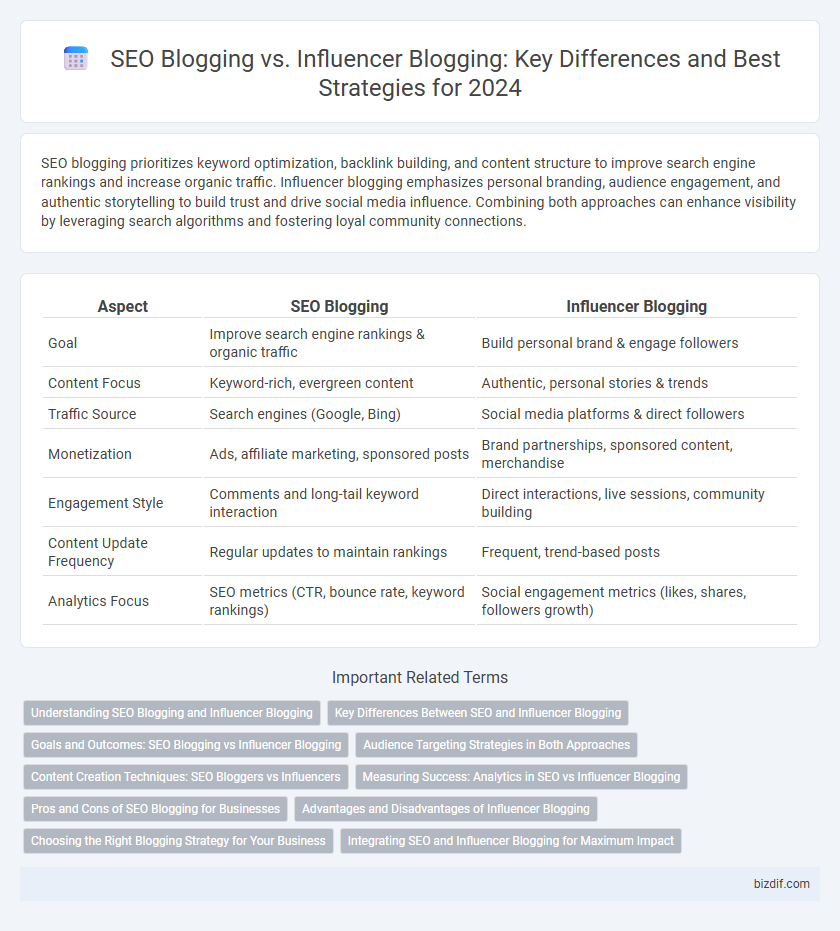SEO blogging prioritizes keyword optimization, backlink building, and content structure to improve search engine rankings and increase organic traffic. Influencer blogging emphasizes personal branding, audience engagement, and authentic storytelling to build trust and drive social media influence. Combining both approaches can enhance visibility by leveraging search algorithms and fostering loyal community connections.
Table of Comparison
| Aspect | SEO Blogging | Influencer Blogging |
|---|---|---|
| Goal | Improve search engine rankings & organic traffic | Build personal brand & engage followers |
| Content Focus | Keyword-rich, evergreen content | Authentic, personal stories & trends |
| Traffic Source | Search engines (Google, Bing) | Social media platforms & direct followers |
| Monetization | Ads, affiliate marketing, sponsored posts | Brand partnerships, sponsored content, merchandise |
| Engagement Style | Comments and long-tail keyword interaction | Direct interactions, live sessions, community building |
| Content Update Frequency | Regular updates to maintain rankings | Frequent, trend-based posts |
| Analytics Focus | SEO metrics (CTR, bounce rate, keyword rankings) | Social engagement metrics (likes, shares, followers growth) |
Understanding SEO Blogging and Influencer Blogging
SEO blogging centers on crafting keyword-rich content designed to improve search engine rankings and drive organic traffic over time. Influencer blogging leverages personal brand authority and social media presence to engage audiences and promote products or ideas through authentic storytelling. Understanding these distinctions helps marketers tailor strategies for visibility through optimized content or relational trust via influencer connections.
Key Differences Between SEO and Influencer Blogging
SEO blogging emphasizes keyword research, on-page optimization, and backlinks to improve search engine rankings and drive organic traffic over time. Influencer blogging relies on personal branding, social media reach, and audience engagement to generate immediate impact and trust within a niche. SEO blogging targets long-term visibility through content strategy, while influencer blogging focuses on relationship-building and authentic promotion for faster follower growth.
Goals and Outcomes: SEO Blogging vs Influencer Blogging
SEO blogging aims to enhance website visibility and drive organic traffic through keyword optimization and search engine ranking improvements. Influencer blogging focuses on building personal brand authority and engaging a dedicated audience to drive conversions and social media influence. Both strategies target different outcomes: SEO prioritizes long-term search presence, while influencer blogging emphasizes real-time engagement and trust.
Audience Targeting Strategies in Both Approaches
SEO blogging leverages keyword research and search intent analysis to attract users actively seeking specific information, optimizing content for higher search engine rankings and organic traffic growth. Influencer blogging targets niche communities through personalized storytelling and trust-building, utilizing social proof and social media engagement to drive audience loyalty and brand partnerships. Both approaches rely on understanding audience demographics and behavior, but SEO emphasizes discoverability while influencer blogging focuses on relational influence.
Content Creation Techniques: SEO Bloggers vs Influencers
SEO bloggers prioritize keyword research, meta tags, and backlink strategies to enhance search engine rankings, ensuring their content is optimized for discoverability. Influencer bloggers focus on authentic storytelling, engaging visuals, and personal brand consistency to build trust and foster direct audience interaction. Both approaches utilize data analytics, but SEO bloggers lean towards performance metrics like click-through rates, while influencers gauge engagement through comments and shares.
Measuring Success: Analytics in SEO vs Influencer Blogging
Measuring success in SEO blogging primarily relies on analytics such as organic traffic, keyword rankings, and conversion rates tracked through tools like Google Analytics and Search Console. Influencer blogging success is gauged by engagement metrics, including likes, shares, comments, and audience growth measured on social media platforms and influencer marketing tools. Both strategies benefit from data-driven insights but emphasize different performance indicators aligned with their unique goals.
Pros and Cons of SEO Blogging for Businesses
SEO blogging enhances organic search visibility, driving targeted traffic with long-term benefits and higher conversion potential for businesses. The approach requires consistent keyword research and quality content creation, which can be time-consuming and demand ongoing optimization efforts. However, SEO blogging provides measurable ROI through improved search rankings and sustained audience engagement without relying heavily on paid promotions.
Advantages and Disadvantages of Influencer Blogging
Influencer blogging offers a unique advantage by leveraging personal brand trust and direct audience engagement, which often results in higher conversion rates and authentic content. However, its reliance on individual personality can limit scalability and presents risks such as audience fatigue or reputation damage. Unlike SEO blogging's focus on keyword optimization and organic search traffic, influencer blogging depends heavily on social media presence and follower interaction for success.
Choosing the Right Blogging Strategy for Your Business
SEO blogging targets long-tail keywords and structured content to boost organic search rankings and drive consistent traffic, making it ideal for businesses seeking scalable growth. Influencer blogging leverages personal brand authority and audience engagement to create authentic connections, suitable for brands aiming to build trust and expand social reach rapidly. Selecting the right blogging strategy depends on your business goals, whether prioritizing search visibility or fostering influencer-driven conversions.
Integrating SEO and Influencer Blogging for Maximum Impact
Integrating SEO and influencer blogging leverages keyword optimization alongside authentic audience engagement to maximize online visibility and brand credibility. Utilizing SEO strategies such as targeted keywords and meta tags enhances search engine rankings, while influencer collaborations bring trust and social proof from established communities. Combining both approaches drives sustainable traffic growth and amplifies content reach across multiple digital platforms.
SEO blogging vs influencer blogging Infographic

 bizdif.com
bizdif.com